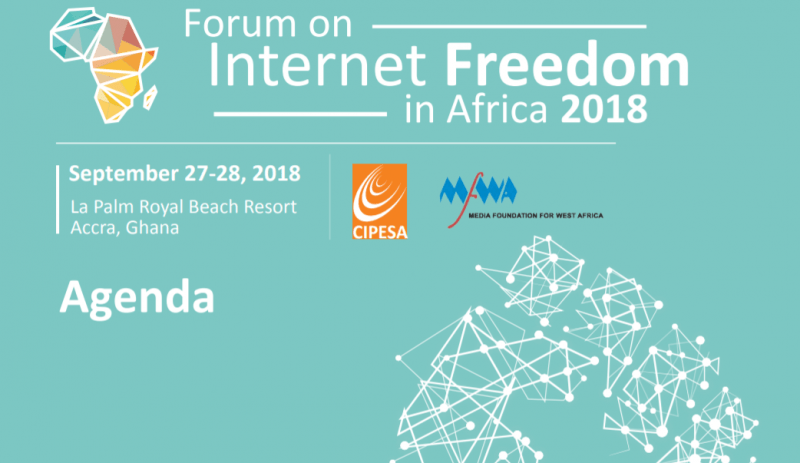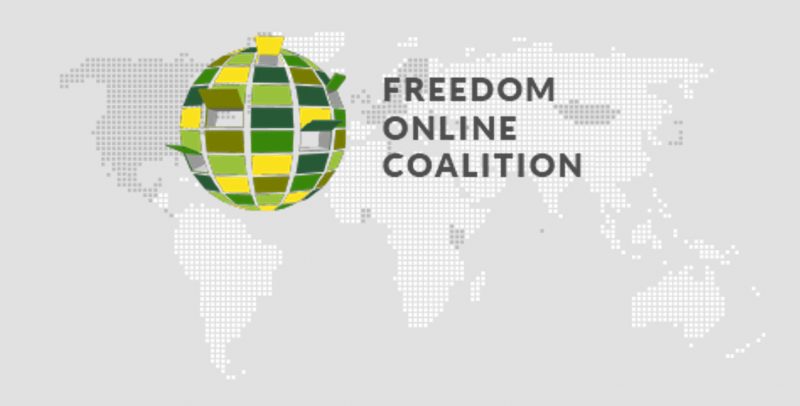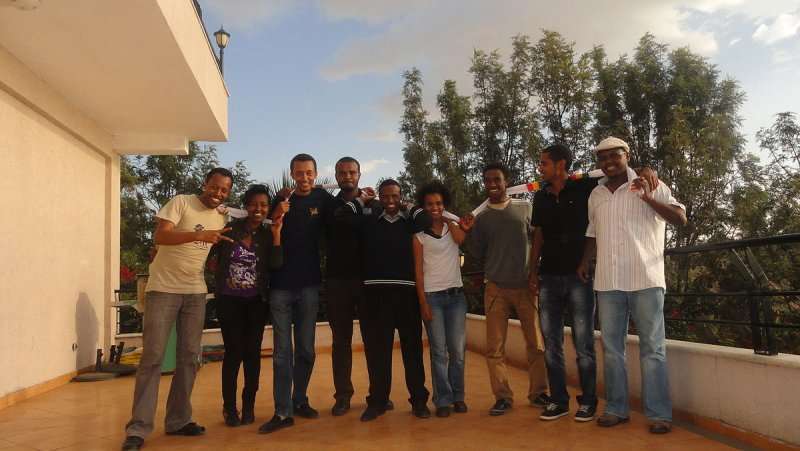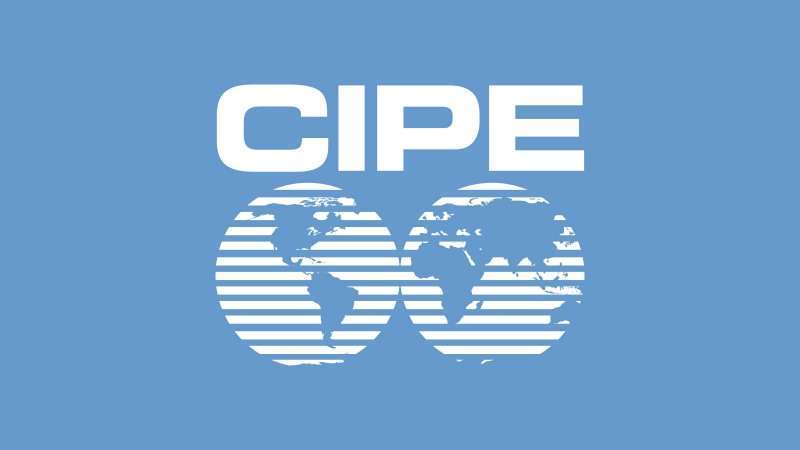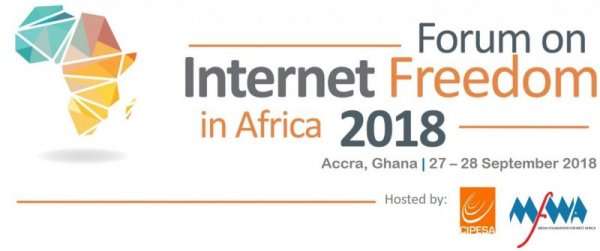Agenda |
Please find the final agenda for the Forum on Internet Freedom in Africa taking place in Accra, Ghana here.
Meet representatives from the Freedom Online Coalition (FOC) at FIFAfrica18
Announcement |
Representatives from the Freedom Online Coalition (FOC) will attend the Forum on Internet Freedom in Africa 2018 (FIFAfrica18) taking place in Accra, Ghana on September 27-28. At FIFAfrica18, the FOC will introduce Forum participants to the work of the Coalition. Participants will also have the opportunity to engage with representatives from the FOC and the multi-stakeholder FOC Advisory Network, as well as and raise internet freedom issues they would like the Coalition to address.
The Freedom Online Coalition (FOC) represents 30 governments who have committed to work together to advance human rights and fundamental freedoms online through a multi-stakeholder approach. The Coalition provides a forum for like-minded governments to coordinate efforts and work with civil society, the private sector, and other Internet stakeholders to support the ability of individuals to exercise their human rights and fundamental freedoms online.
The FOC is founded upon the notion that the same rights that people have offline must also be protected online. The FOC seeks to identify best practices regarding the application of human rights obligations and commitments in the evolving online landscape, as well as to call attention to conditions that undermine those rights by issuing joint-statements, coordinating policy responses among members, and leveraging civil society, the private sector, and other internet stakeholders to encourage rights abiding behaviour online.
Further, the FOC Advisory Network serves as an additional mechanism for the FOC to engage with non-governmental internet stakeholders. It serves as a platform for multi-stakeholder dialogue, advice, and collaboration. The Digital Defenders Partnership, a grant making mechanism associated with the FOC, provides rapid response to a range of threats to internet freedom, from supporting bloggers and cyber activists who find themselves under digital attack, to helping them exercise their rights online in repressive environments.
FIFAfrica is hosted by the Collaboration on International ICT Policy for East and Southern Africa (CIPESA) in partnership with the Media Foundation for West Africa (MFWA) and focuses exclusively on internet rights and freedoms. It looks at them through the lens of policy, regulation, and governance and offers a platform for critical engagement of diverse stakeholders in identifying the most pressing internet rights-related issues and challenges that have to be addressed at national and regional levels in Africa. The Forum also identifies opportunities for bringing the debate on the importance of human rights online at national, regional and global fora and aims to identify effective ways to engage with them.
Join the FOC at an informal session on Friday September 28 at the FIFAfrica18 Main Hall during the lunch break at 13.00-14.00.
Zone 9 Bloggers To Speak on Censorship, Repression and Surveillance at the Forum on Internet Freedom in Africa 2018 (FIFAfrica18)
Announcement |
In order to contribute to the democratic discourse in Ethiopia, in May 2012, nine individuals formed the Zone 9 blogging collective – a loose network of activists regularly blogging and campaigning on human and democratic rights. However, two weeks after the launch of the initiative, the Ethiopian government blocked access to the collective’s online platform. In April 2014, six members of the collective were jailed on allegations of working with foreign organisations and rights activists by “using social media to destabilise the country.” The other three members fled into exile.
At the upcoming Forum on Internet Freedom in Africa 2018 (FIFAfrica18) members from the collective will share a stage and speak on their experiences of censorship, repression and surveillance. In an hour and half long session, members of the collective will share their stories including the tactics employed by the state to surveil and censor them, their trial, imprisonment for 15-18 months, and post-incarceration trauma. Their participation will serve as a means of raising awareness on the realities of being an activist in a repressive state and life after release from incarceration.
See draft Forum agenda
The collective gets its name from the eight zones of the notorious Kaliti prison in Addis Ababa where political prisoners are housed. The ninth zone is a metaphorical extension of the zones to apply to the rest of the country due to the harsh controls on freedom of speech and association across Ethiopia at the time.
In February 2018, after six years of facing charges that included terrorism and inciting violence, prosecutors in Ethiopia dropped all charges against the last members of the collective that still faced prosecution. The announcement came as part of ongoing economic and political reforms in the country since the resignation of former Prime Minister Hailemariam Dessalegn in February 2018, and appointment of a new premier, Abiye Ahmed, two months later.
Since then, the government has freed thousands of prisoners; announced measures to liberalise the telecom sector; and dropped charges against many opposition leaders, bloggers, and activists. Further, the new administration has lifted the state of emergency that had been reinstated in February 2018, reconnected mobile and broadband internet services that were cut off since 2016, and unblocked 246 websites, blogs, and news sites that had been inaccessible for over a decade.
See more about Ethiopia’s reforms.
Who are the Zone 9 Bloggers?

Zelalem Kibret is an Ethiopian scholar and blogger. He was previously a Scholar-at-Risk fellow at the Hutchins Center for African and African American Research, and the Center for Human Rights and Global Justice, at New York University School of Law. By training, Zelalem is a lawyer specialised in Public International Law. Until April 2014, he was a Professor of law at Ambo University in Ethiopia.
Among his interests is research which focuses on transitional politics and justice, traditional justice, individuals in international law, counter-terrorism, new social movements, and liberation technology.
Zelalem is the co-recipient of the 2015 Committee to Protect Journalists’ (CPJ) International Press Freedom award and the 2015 Reporter Sans Frontieres’ (RSF) Citizen-Journalist award. He earned his LL.M degree from Addis Ababa University in Public International Law.

Nathenael Feleqe Aberra is a co-founding member of Zone 9 Activists and Blogging collective. He is an active member of the Ethiopian Economics Association and a full time employee in a financial intuition in Ethiopia with close to eight years’ experience in Human Resource Management. His interest areas include Economic Development, Democracy and Human Rights.

Jomanex Kasaye | Born and raised in “the jewel of rift valley” – Adama also known as Nazareth located 90 km from the capital Addis Ababa, Jomanex is an Information Technology enthusiast, who has previously worked as a tutor and system administrator in addition to running his own businesses. He is a co-founding member of the Zone 9 Activists and Blogging collective and now lives in exile.
Befekadu Hailu Techane describes himself as a Management Information Systems (MIS) expert by profession who turned a writer by inclination. His novella titled “Children of Their Parents” won the Bill Burt Award for African Literature (Ethiopia) in 2012. He has worked as an editor for Enqu Magazine, editor-in-chief for Weyeyet Magazine and volunteering editor for Global Voices [all in Amharic]. His blogging and activism work has seen him jailed four times – including an 18 month detention period. Befekadu is among the co-founders of the Zone 9 Activists and Blogging collective.
He currently works as a columnist for Duestche Welle Amharic Service, as a freelancing journalist for ethiotube.net, an internet TV channel, and part-time program coordinator for Ethiopian Human Rights Project.

Atnafu Brhane is a blogger and human rights activist in addition to being one of the co-founders of the Zone 9 Activists and Blogging collective. He began his career as an IT expert for a local administration office in Ethiopia before joining the collective. He also worked with Article 19 East Africa to give digital security trainings for human rights activists and journalists.
His work with the collective saw him get arrested and charged with terrorism in 2014 following which he spent 18 months in prison. He currently works as Digital Media Coordinator and Campaigner for the Ethiopia Human Rights Project.
 Abel Wabella describes himself as a passionate storyteller, who is fascinated by the commencement of the digital era. As a social media marketer, Abel has developed a sound knowledge of new media tools and techniques. Since he started blogging in 2011, he has engaged in social media activism, humanitarian advocacy, social justice projects, localisation and business projects.
Abel Wabella describes himself as a passionate storyteller, who is fascinated by the commencement of the digital era. As a social media marketer, Abel has developed a sound knowledge of new media tools and techniques. Since he started blogging in 2011, he has engaged in social media activism, humanitarian advocacy, social justice projects, localisation and business projects.
As such, Abel shifted his career interests from mechanical engineering into the media arena. His work saw him detained, which served to further fuel his activism. Abel has a vast virtual office experience and is a member of the Global Voices volunteer community of more than 1,400 writers, analysts, online media experts, and translators, which localises its content into 40 languages including Amharic. He is also a co-founder of the Zone 9 Activists and Blogging collective.
Abel is currently working on newly established media called Gobena Street.
CIPE to Preview New Policy Guide on Digital Economy at the Forum on Internet Freedom in Africa
Announcement |
The Center for International Private Enterprise (CIPE) will preview a new resource titled Digital Economy Enabling Environment Guide, at the Forum on Internet Freedom in Africa (FIFAfrica) 2018, set to take place 26–28 September, 2018, in Accra, Ghana. This preview comes ahead of a formal launch at the upcoming conference of the Aspen Network of Development Entrepreneurs (ANDE), on 2–4 October, 2018 in Tarrytown, New York.
The guide was developed in collaboration with the New Markets Lab (NML) and focuses on four priority topics that serve as the building blocks of digital economy: Consumer Protection, Data Protection, Cybersecurity, and Electronic Transactions (e-payments and e-signatures). The guide explains key regulatory considerations and helps policymakers, the private sector, and other stakeholders reach a shared understanding of these often complex topics in order to engage in constructive policy dialogue.
Further, the guide includes Legal Deep Dives with detailed information on the applicable international and regional frameworks; examples of different regulatory approaches used around the world; considerations for implementation and enforcement of laws and regulations; and relevant institutional frameworks that influence the digital economy.
Anna Kompanek, CIPE Director for Global Programs, will highlight the section of the guide at a FIFAfrica session on Consumer Rights Protection in the Digital Age, scheduled for 28 September. “Previewing the Digital Economy Enabling Environment Guide at FIFAfrica provides a valuable opportunity to support public-private dialogue efforts throughout the continent on issues key to shaping democratic discourse on digital economy,” she said.
Going forward, CIPE and NML will leverage this new resource in their respective work to facilitate crucial multi-stakeholder policy conversations and regulatory reforms in countries around the world.
CIPE strengthens democracy around the globe through private enterprise and market-oriented reform in order to expand access to opportunity for all citizens and help build democracies that deliver. By working with private sector organizations, CIPE is helping businesses find their voice in policymaking on a range of digital economy issues.
NML is a non-profit center for law, development, and entrepreneurship that houses comparative expertise and an international team of lawyers focused on socially accountable economic, legal and regulatory reform. NML sees law as a driving force that can generate entrepreneurship and economic development.
FIFAfrica18: Growing Africa’s Community of Internet Freedom Leaders
By Juliet Nanfuka |
In less than a month, the Forum on Internet Freedom in Africa 2018 (#FIFAfrica18) will take place in Accra, Ghana. Hosted by the Collaboration on International ICT Policy for East and Southern Africa (CIPESA) in partnership with the Media Foundation for West Africa (MFWA), this year’s Forum is the first to be held in West Africa. Since its inception in 2014, the Forum has been hosted in East Africa and Southern Africa.
FIFAfrica focuses exclusively on internet rights and freedoms and looks at them through the lens of policy, regulation, and governance. It offers a platform for critical engagement of diverse stakeholders in identifying the most pressing internet rights-related issues and challenges that have to be addressed at national and regional levels. It also identifies opportunities for bringing the debate on the importance of human rights online at national, regional and global fora and aims to identify effective ways to engage with them.
At the practical level, the Forum works to support skills development including in digital security practices for safe and secure ICT access and adoption, policy advocacy, and engagement processes.
Engagements at the Forum reflect current trends and concerns in access and usage of the internet and related technologies on the continent. As such, each year since 2014 has seen us launch themed research on the State of Internet Freedom in Africa. The Forum also coincides with the annual commemoration of the International Day for Universal Access to Information (IDUAI) that is marked every September 28.
This year we have lined up panel discussions, workshops, hubs, exhibitions and lightning talks on a diversity of topics including advancing advocacy and research on gender-based cyber violence in Africa, civic technology and social innovation, online content regulation trends in Africa, and community networks for internet access. Other topics include: African content online, consumer rights in the digital age, digital rights advocacy, the economic costs of social media taxes and internet shutdowns, as well as media and misinformation, and protecting vulnerable users of the internet. Additionally, FIFAfrica will provide a stage for the first assembly of the Ethiopian Zone 9 Bloggers since their release, where they will share their experiences of censorship amidst the plight of freedom of expression.
The Forum agenda and sessions have been shaped by a public call for proposals and speakers and thus represent diverse voices, expertise and stakeholder groups, many of them new to FIFAfrica.. Among these are the Council of Europe who will host a panel that will contribute to the on-going efforts on harmonisation of national cybercrime laws with international and regional standards in the African continent, and provide a specific focus on human rights safeguards. Meanwhile, digital rights group NetBlocks will have their Africa launch of the Cost Of Shutdown Tool (COST). The tool was developed by NetBlocks in collaboration with the Internet Society and first unveiled at RightsCon Toronto in May 2018. It is aimed at automating the task of economic estimation of the impact of internet shutdowns, mobile data blackouts and social media restrictions.
Additionally, September 28, 2018 will mark the third commemoration of the International Day for Universal Access to Information (IDUAI), first celebrated by UNESCO in 2016. The IDUAI reinforces target 16.10 of the Sustainable Development Goals (SDG) which calls for ensuring public access to information and protection of fundamental freedoms. As part of the IDUAI 2018 celebrations, UNESCO is set to host a session at FIFAfrica to raise awareness on the intersection of access to information and application of the internet universality indicators.
Skills workshops at the Forum will include one on strategic litigation led by the Media Legal Defence Initiative (MLDI) which is aimed at building the capacity of internet activists to collaborate across disciplines to more effectively push back against regressive legal frameworks that are not conducive to access and use of the internet in Africa. CIPESA, together with the UK-based Small Media, will also host a two-day interactive workshop on internet freedom and the Universal Periodic Review (UPR). The workshop is part of a wider project working to support civil society organisations across Africa to engage with the UPR process through research, capacity development and developing tools to support internet freedom advocacy.
The Forum’s growing audience – from 80 participants representing six countries in 2014 to over 250 from 35 countries in 2017 – the diversity of participants and discussions, reflects increased awareness among Africa’s growing internet user and stakeholder community for the need to pave the way for broader and more impactful work on advancing digital rights advocacy and drawing up common strategies to promote internet freedom.
This year, we aim to continue on this growth path as the community of internet freedom advocates steadily grows and the opportunities to advance internet freedom are progressively realised particularly in the face of persistent affronts to the rights of African online users.
You can still register here | See the draft agenda

